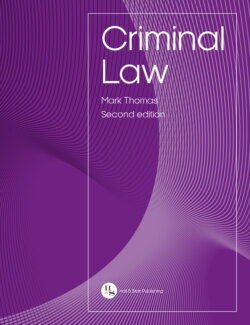Читать книгу Criminal Law - Mark Thomas - Страница 61
На сайте Литреса книга снята с продажи.
2.2Defining the actus reus
ОглавлениеFrom the above, you should have noticed that the meaning of actus reus is a hotly contested matter, with academics and the courts disagreeing over the appropriate terms to be used in a given case. Two statements deserve mention.
Lord Simon in DPP for Northern Ireland v Lynch [1975] AC 653 commented in his dissenting judgment that actus reus and mens rea
have, however, justified themselves by their usefulness; and I shall myself employ them in their traditional senses—namely actus reus to mean such conduct as constitutes a crime if the mental element involved in the definition of the crime is also present (or, more shortly, conduct prohibited by law); and mens rea to mean such mental element, over and above volition, as is involved in the definition of the crime.
The most commonly cited judicial position is that of Lord Diplock in R v Miller [1983] 2 AC 161, who recounted that
it would I think be conducive to clarity of analysis of the ingredients of a crime that is created by statute … if we were to avoid bad Latin and instead to think and speak … about the conduct of the accused and his state of mind at the time of that conduct, instead of speaking of actus reus and mens rea.
The Law Commission’s draft Criminal Code of 1989 (Law Com No 177, 1989) followed the statement of Lord Diplock and advised the use of the term ‘external elements’ in place of actus reus and ‘fault element’ in place of mens rea. The Criminal Code was not, however, implemented.
Despite these criticisms, the author takes the view that such a debate is unproductive, and instead it should be accepted that the term is now used simply as a form of ‘shorthand’ for lawyers. Probably the best exposition of this point was provided by Perkins (‘A Rationale of Mens Rea’ (1939) 52 Harv LR 905), who argued:
Some years ago the mens rea doctrine was criticised on the ground that the Latin phrase is ‘misleading’. If the words ‘mens rea’ were to be regarded as self-explanatory they would be open to this objection, but they are to be considered merely as a convenient label attached to any psychical fact sufficient for criminal guilt … This includes a field too complex for any brief self-explanatory phrase, and since it is important to have some sort of dialectic shorthand to express the idea, this time-honoured label will do as well as any.
As a result, the terms actus reus and mens rea shall be retained for use in this text.
